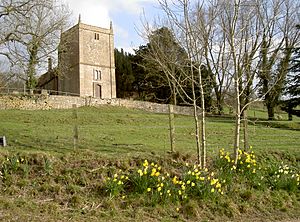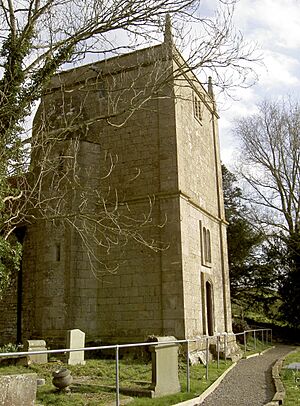Church of St Martin, North Stoke facts for kids
Quick facts for kids Church of St Martin |
|
|---|---|
 |
|
| Location | North Stoke, Somerset, England |
| Built | 12th century |
|
Listed Building – Grade II*
|
|
| Official name: Church of St Martin | |
| Designated | 1 February 1956 |
| Reference no. | 1215229 |
| Lua error in Module:Location_map at line 420: attempt to index field 'wikibase' (a nil value). | |
The Church of St Martin is a very old and special church located in North Stoke, Somerset, England. It was built way back in the 12th century, which means it's over 800 years old! Because it's so important and historic, it's officially recognized as a Grade II* listed building, which helps protect it.
Contents
History of St Martin's Church
Early Beginnings and Roman Times
People believe there has been a church on this spot since the year 360. Even before that, it might have been the site of an ancient Roman temple. This shows how long this location has been important for gatherings and worship.
Building the Current Church
The church you see today started to be built in the 1100s. The tall, two-part tower on the west side is from that time. Many other parts of the church were added or changed between the 13th and 16th centuries.
Restoration and Repairs
In the 1800s, a lot of major restoration work was done. This helped to fix or replace many parts of the old building. More recently, in 2012, the church had more repairs, including new electrical wiring and fixes to its roof.
Community and Media
The Church of St Martin is part of a group of churches called a benefice. This group includes churches in Weston, North Stoke, and Langridge. On January 10, 2021, the church was even featured on BBC Radio 4's Sunday Worship program.
Architecture and Features
Church Design
Besides its impressive tower, the church has a main area called the nave and a special area near the altar called the chancel. There is also a south porch, which is an entrance area.
Inside the Church
Inside, you can find a font that was carved from an old sacrificial altar. There are also special monuments from the 1700s that honor people from that time.
Churchyard and Nature
Outside, in the churchyard, there is a very old yew tree. These trees can live for hundreds, or even thousands, of years!
See also
- List of ecclesiastical parishes in the Diocese of Bath and Wells


